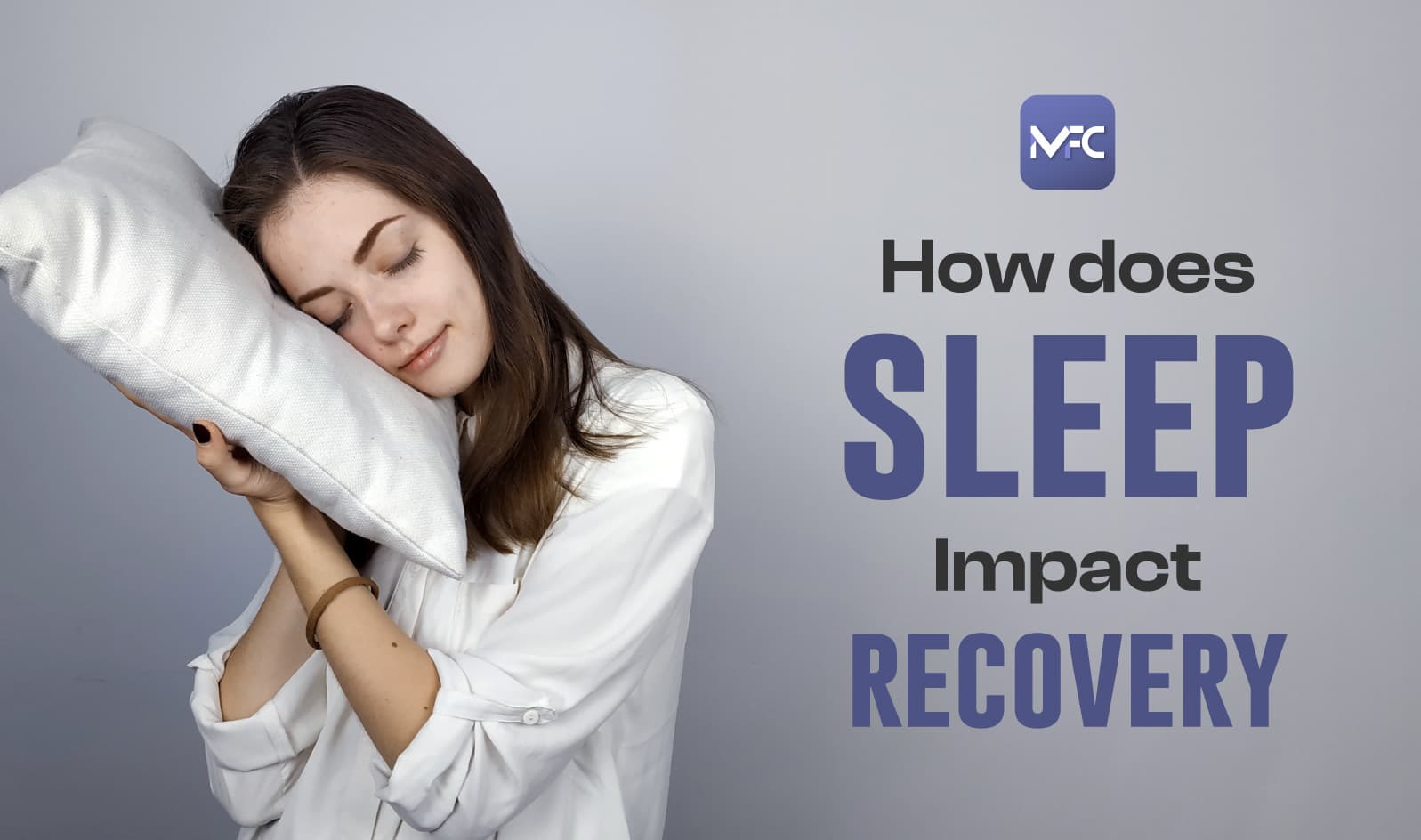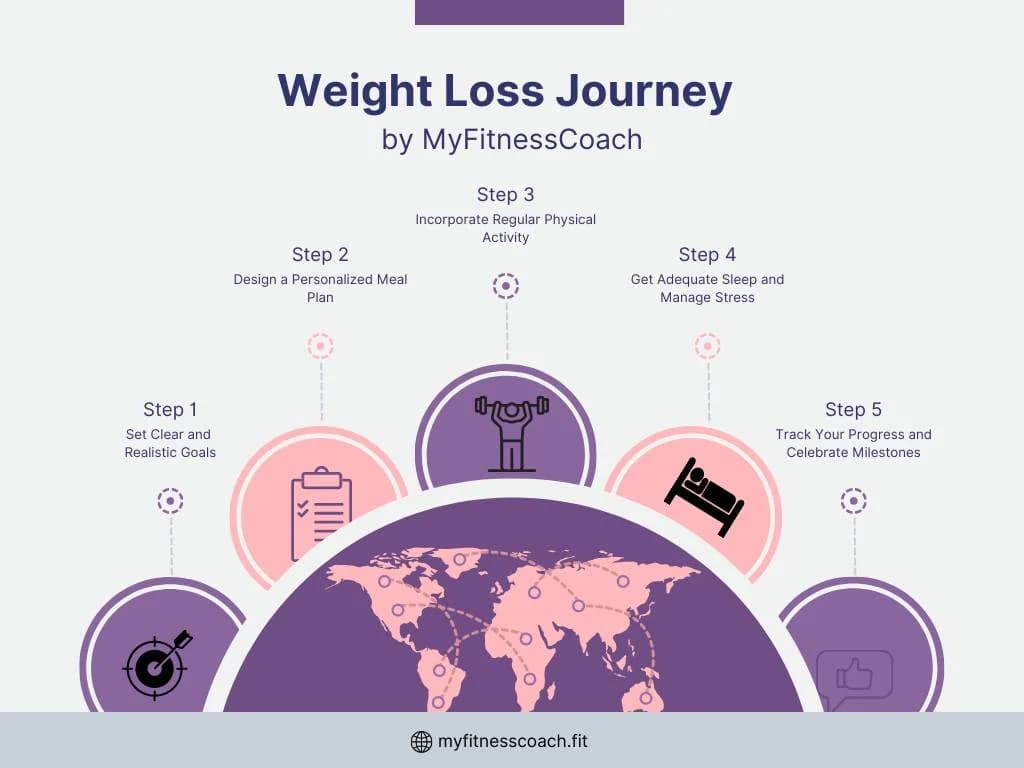How Does Sleep Impact Recovery and Performance?

MyFitnessCoach
December 4, 2024
In the world of fitness, many people focus on training hard, eating well, and staying consistent. While these are all vital for achieving your fitness goals, there's another component that’s equally essential but often overlooked: sleep. Quality sleep doesn’t just make you feel refreshed; it’s a critical factor that affects your body’s ability to recover and perform at its best. In this article, we’ll dive into the role of sleep in muscle recovery, injury prevention, athletic performance, and how improved sleep can make a difference in your fitness journey.
How Sleep Enhances Athletic Performance
Sleep not only aids in recovery but also directly affects performance. A good night’s rest improves alertness, reaction time, and overall mental sharpness, all of which are essential for peak performance. Studies have shown that athletes who get enough sleep experience better reflexes, more accurate movements, and an enhanced ability to perform complex tasks with precision.
- Better Reaction Time and Coordination: When you're well-rested, your brain and body work in sync. For athletes, this translates to quicker reflexes and better coordination. Whether it’s catching a ball or responding to an opponent, a good night’s sleep can be the difference between winning and losing.
- Increased Endurance: When you’re sleep-deprived, your body struggles to sustain energy levels over extended periods. This can be a serious drawback, especially for endurance athletes who rely on consistent energy output. With proper sleep, your endurance and stamina improve, allowing you to train harder and longer.
- Mental Resilience and Focus: High-quality sleep improves focus and mental resilience, which is vital for setting and sticking to goals. When you’re sleep-deprived, decision-making abilities and motivation drop, making it harder to stay consistent with your fitness routine.
Sleep and Injury Prevention
Injuries can sideline any athlete, and they’re often caused by inadequate recovery or impaired motor skills due to lack of sleep. When you’re sleep-deprived, you’re more prone to making mistakes, whether it’s poor posture during exercises or lack of attention to form. This increases the chance of injury, which can lead to frustrating setbacks.
- Reduced Inflammation: Sleep regulates cytokine production, which helps control inflammation in the body. Without enough sleep, inflammation increases, making you more prone to injuries, soreness, and joint pain.
- Better Muscle Coordination: Sleep strengthens your neuromuscular connections, which helps with muscle coordination and reflexes. Inadequate sleep can lead to missteps during exercises, increasing the likelihood of sprains and strains.
- Improved Recovery Rate: When you get enough sleep, your body recovers faster, allowing you to train consistently without risking overtraining or burnout. This keeps you on track with your fitness goals without interruptions due to injuries.
The Science Behind Sleep Cycles and Recovery
To understand the link between sleep and fitness, it’s helpful to know a bit about sleep cycles. Sleep is divided into four main stages: three non-REM stages and one REM stage. Each of these stages plays a role in recovery and performance.
1. Non-REM Sleep: The first few stages of sleep are classified as non-REM sleep, and they’re crucial for physical recovery. During this period, your heart rate and breathing slow down, muscles relax, and blood flow increases to your muscles. This stage is essential for tissue growth and cell repair.
2. Deep Sleep (Stage 3): Also part of non-REM sleep, this is when your body goes into full recovery mode. Growth hormones are released to stimulate muscle repair and regeneration. Spending enough time in deep sleep is necessary for physical recovery.
3. REM Sleep: This is the dream phase, where your brain is highly active, processing memories, emotions, and new information. While it’s more associated with mental recovery, REM sleep is vital for cognitive function and mental focus, which translates into better decision-making and motivation for training.
How Much Sleep Do You Need for Optimal Recovery?
The amount of sleep needed varies from person to person, but most adults require between 7-9 hours of sleep per night. For athletes or individuals involved in intense physical training, even more sleep may be necessary to allow the body enough time to recover and adapt.
Some signs that you might need more sleep include persistent fatigue, slow recovery times, frequent injuries, and a lack of motivation for workouts. Tracking your sleep habits and noticing how you feel during training sessions can help you determine if you’re getting enough rest.
Tips to Improve Sleep Quality for Better Performance
If you’re struggling to get quality sleep, here are some tips to help:
- Establish a Routine: Going to bed and waking up at the same time every day helps regulate your internal clock, making it easier to fall asleep and wake up feeling rested.
- Limit Screen Time Before Bed: The blue light from screens can interfere with melatonin production, making it harder to fall asleep. Try to limit screen exposure at least an hour before bed.
- Create a Relaxing Environment: Keep your room cool, dark, and quiet. Consider using blackout curtains or earplugs if necessary. A comfortable sleeping environment can significantly improve your sleep quality.
- Avoid Stimulants Late in the Day: Caffeine and nicotine are stimulants that can disrupt your ability to fall asleep. Try to avoid them in the evening hours to promote better sleep.
- Incorporate Relaxation Techniques: Practicing mindfulness, meditation, or deep breathing before bed can help calm your mind and prepare you for a restful night.
How MyFitnessCoach Can Help You Maximize Your Sleep and Recovery
At MyFitnessCoach, we understand the crucial role sleep plays in your fitness journey. That’s why our app is designed to provide you with workouts and guidance tailored to your personal needs, helping you balance exertion with proper recovery. Our HIIT routines are intense and effective, designed to get you results in a manageable amount of time, which gives you more time to prioritize rest and recovery. With tools like our progress tracker and workout reminders, you’ll find it easier to integrate healthy sleep habits with your exercise routine.

Start your journey with MyFitnessCoach today, and take the first step toward reaching your goals while prioritizing the rest and recovery your body needs. With the right balance of exercise and sleep, you’ll experience faster recovery, better performance, and a healthier lifestyle.
Similar Articles
Stay informed with these similar articles.

MyFitnessCoach
October 18, 2023
What Does Body Goals Mean? A Path to a Healthy Lifestyle
In the world we live in now, lots of people talk about "body goals," which means having a body that's seen as perfect. On social media, in magazines, and on TV, we see lots of pictures of people with what seems like perfect bodies, which makes us feel like we have to look like them. But the real meaning of "body goals" is more than just looking good. It's about taking care of your whole self, not just how you look. In this article, we will discuss what does body goals actually mean and how you can achieve your body goals. Let’s get started:
.webp&w=3840&q=75)
MyFitnessCoach
September 5, 2023
How Much Protein in an Egg | The Nutritional Power
Eggs have long been a breakfast favorite for many, and for good reason. They're not only delicious but also packed with essential nutrients, making them a versatile and nutritious addition to your diet. One of the most common questions about eggs is, "How much protein is in an egg?" In this comprehensive guide, we'll delve into the world of eggs and explore their protein content, nutritional benefits, and how they can contribute to a balanced diet.

MyFitnessCoach
May 18, 2023
Fitness Guide: How Do I Start A Weight Loss Journey
Ready to start on a life-changing weight-loss journey? Congratulations for taking the first step towards being a better and happier version of yourself! Starting off a weight-loss journey may be both satisfying and stressful. With so much information available, having a well-defined plan and trusted assistance in achieving your goals is important. This article will help you start your weight-loss journey and achieve the results you desire.
